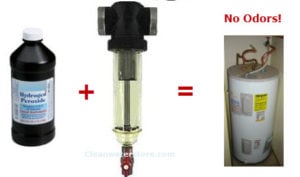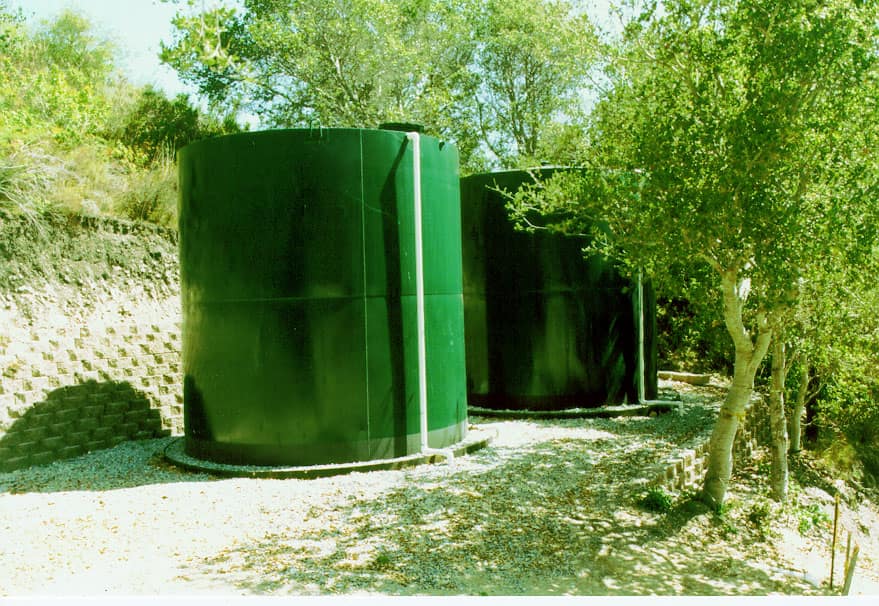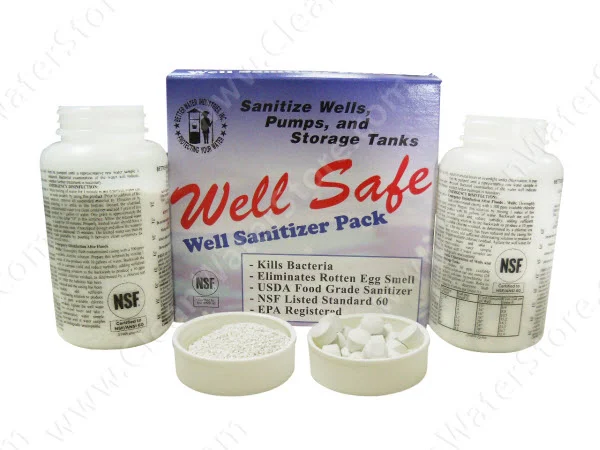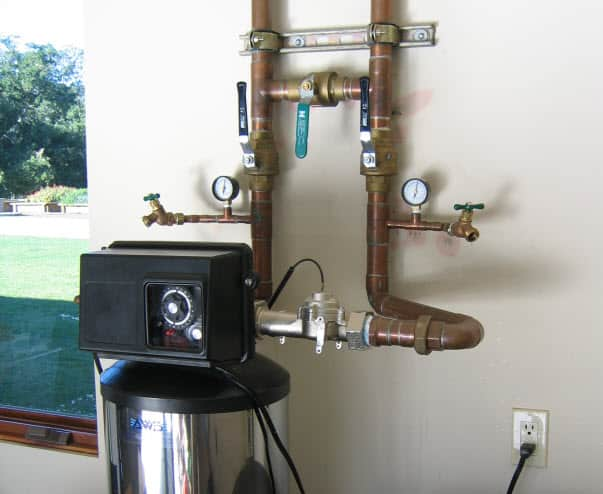How to Tell if Odors From Well Water Are Coming from Well or Inside the House
How to Tell if Well Water Odor is Coming from the Well or Inside the House
Water containing hydrogen sulfide gas (“H2S”) has a distinctive “rotten egg” odor, which may be especially noticeable when running hot water.
Such water can discolor coffee, tea, and other beverages and alter the appearance and taste of cooked foods. Hydrogen sulfide (“H2S”) gas is a nuisance that is not usually a health risk at concentrations typically found in household water.
Hydrogen sulfide can be toxic. Usually, the gas can be detected long before it reaches harmful concentrations. H2S is flammable and poisonous. While such concentrations are not typical, if gases are released in a confined area, they could cause nausea, illness, and, in extreme cases, death.
H2S dissolved in water can corrode plumbing metals such as iron, steel, copper, and brass and exposed metal parts in washing machines and other water-using appliances. Switching to an aluminum rod in water heaters can help eliminate the odor while still providing corrosion protection.
The corrosion of iron and steel from hydrogen sulfide forms ferrous sulfide or “black water,” which can darken silverware and discolor copper and brass utensils. Hydrogen sulfide can also interfere with the effectiveness of water softeners and filter systems.
Sources of Hydrogen Sulfide
Iron and sulfur bacteria present in groundwater use iron and sulfur as energy sources and chemically change sulfates to produce H2S gas. These bacteria use the sulfur available from decaying organic matter, plants, rocks, or soil and often thrive in an iron-rich environment.
The harmless, non-toxic bacteria usually exist in oxygen-deficient environments, such as deep wells and plumbing systems. The bacteria do not usually cause health problems but contribute to bad tastes and odors at low levels.
Understanding Rotten Egg Odors
Rotten egg odors in water are a common problem that can be caused by the presence of hydrogen sulfide gas. This gas is produced when sulfur-reducing bacteria break down organic matter in the water. The resulting odor is often compared to the smell of rotten eggs and can be unpleasant and embarrassing. Hydrogen sulfide gas can also cause corrosion of metals in plumbing systems, leading to costly repairs and replacements. The presence of hydrogen sulfide in your water supply can affect the taste and appearance of your drinking water, making it essential to address the issue promptly.
The First Step is To Check For Odors in Cold & Hot Water
Diagram of a Typical Water Heater
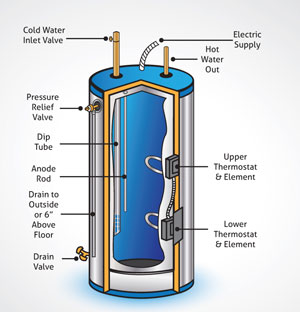
Run a hose bib or tap as close to the well as possible, fill a 5-gallon bucket or other container, and notice if there are odors. If you smell a “rotten egg” odor, this is hydrogen sulfide gas.
If the water smells like oil or asphalt, manganese can be the cause. If it smells like cucumber or sewage, iron and sulfur bacteria are usually the cause.
Aluminum Anode Rod

Run the water hot water from each tap and notice an odor in the hot water, not in the cold water. This indicates a problem with the water heater. Iron and sulfur bacteria can interact with the anode rod in water heaters, resulting in hydrogen sulfide gas only in hot water.
Changing the anode rod to an aluminum-zinc rod can often solve this problem.
It is recommended that you drain your water heater at least once per year. This will flush out the sediment that may accumulate in the bottom and give you an idea of the sediment type and color, if any, are present.
To learn more about odors and what may be causing them, visit our Odors page or read our guide on “How To Treat Sulfur Odors In Well Water.”
Locating the Source of the Odor Inside the House
If you’re experiencing a rotten egg odor in your water, it’s essential to locate the source of the problem. Start by checking your water heater, as it’s a common culprit. If the odor is only present in hot water, it may be due to the magnesium anode rod in your water heater. This rod can react with naturally occurring sulfates in the water to produce hydrogen sulfide gas. Next, inspect your plumbing system, including pipes and fixtures, for signs of corrosion or mineral buildup. You may also want to check your water softener, as it can sometimes contribute to the growth of sulfur-reducing bacteria. By systematically checking these potential sources, you can pinpoint the origin of the odor and take appropriate action.
Sulfur odor in pipes after installing a new treatment system?
We recommend adding a cup of bleach to the pipes after the new softener or whole-house filter and flushing the water heater and household cold water pipes with some bleach to eliminate the odor.
One thing that can happen with odors is that they can still develop in the pipes because of bio-films while there is no odor leaving the new treatment system. This can be worse in sections of the plumbing that are not used much.
Introducing a small amount of chlorine (laundry bleach is fine) and letting the water sit for a couple of hours helps sanitize the pipes and prevents odors from developing in them if that is a problem.
Water Heater Odor Only?
If the odor is primarily in hot water, the water heater needs to be sanitized. Turn off the water pressure to the water heater, add 1 cup of chlorine bleach, and turn the water back on.
If you have a prefilter housing, you can add the bleach there. If not, remove the inlet flex pipe and drain some water out of the water heater. Run hot water in the home for a minute to mix chlorine bleach into the water, and then turn off the water. Let the water heater sit for 2 hours, and then run the hot water until it is clear. Note that this may have to be repeated for severely fouled water heaters.
If the odor returns to the water heater, you may need to remove or replace the anode rod.
(Click here to learn more about water odor.)
Sulfur Odors on Your Second Level or Upstairs Floors Only?
In some cases, it is worse on upper floor levels because the gas can rise and appear out of fixtures on the upper floors.
The first step in eliminating this is to ‘shock chlorinate' the pipes. This is done by adding enough bleach to reach a 100 to 200 ppm chlorine residual and then allowing the chlorinated water to sit in the pipes for
6 to 8 hours or overnight.
If the odor or gasses disappear but return in a few weeks, the shock chlorination process is repeated.
There are various ways to introduce chlorine bleach into pipes, but having an inline filter housing can make it easy.
With a spindown filter, you can easily turn off the water to the house, unscrew the filter, and add chlorine bleach or peroxide.
-
Heat and Chemical Resistant Spindown Filter Makes it Easy to Add Bleach or Peroxide to Kill Your Odors in Pipes. Turn the water back on and flush your pipes until you smell bleach or see bubbles from the peroxide.
- Let it sit in the pipes for several hours.
- Turn the water back on and flush the pipes.
- No more odors!
Why Does My Water Smell Like Sewage?
If your cold well water smells like sewage, it can be the result of several causes:
- Hydrogen sulfide from iron, sulfur, or other types of bacteria naturally occurring in your well water
- Contaminated pipes with layers of bio-film caused by various types of iron, sulfur, or other types of bacteria.
- Septic tank contamination
First, test your water for coliform bacteria using a lab kit or a do-it-yourself-at-home bacteria test kit.
Shock chlorinate, sanitize your well and piping, and retest if the coliform test is positive.
Install a peroxide injection, chlorine injection system, or aeration with disinfection to eliminate bacteria.
Testing for Contaminants
To determine the cause of the rotten egg odor in your water, it’s crucial to test for contaminants. Start by checking the pH level of your water, as high or low pH levels can contribute to the growth of sulfur-reducing bacteria. You should also test for the presence of hydrogen sulfide gas, as well as other contaminants like iron, manganese, and sulfates. A comprehensive water test can help you identify the source of the problem and determine the best course of treatment. Testing kits are available for home use, or you can send a sample to a professional lab for more detailed analysis. Understanding the specific contaminants in your water will guide you in choosing the most effective treatment method.
Treatment Options
There are several treatment options available to remove rotten egg odors from your water. One common method is to use a carbon filter, which can absorb hydrogen sulfide gas and other contaminants. Another effective solution is a water treatment system that includes an oxidizing filter, which can convert hydrogen sulfide gas into a harmless compound. In some cases, it may be necessary to replace your water heater or plumbing system to eliminate the source of the problem. Consulting with a water treatment professional can help you determine the best treatment option for your specific situation. They can recommend the most suitable system based on the contaminants present in your water and the severity of the odor.
Drinking Water Safety
While rotten egg odors in water can be unpleasant, they are generally not a health concern. However, it’s essential to ensure that your drinking water is safe and free from contaminants. If you’re experiencing a rotten egg odor in your water, it’s crucial to test for other contaminants that may be present. Regular maintenance of your plumbing system and water heater can prevent the growth of sulfur-reducing bacteria and ensure good water quality. By taking these steps, you can ensure that your drinking water is safe and free from contaminants, providing peace of mind for you and your family.
If you still have questions, don’t hesitate to e-mail us at support@cleanwaterstore.com, leave us a message on Facebook, or use our online contact form for prompt, personalized assistance from our trained professionals.


